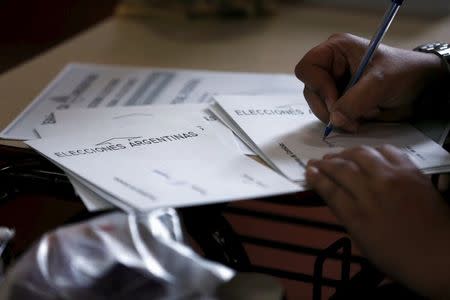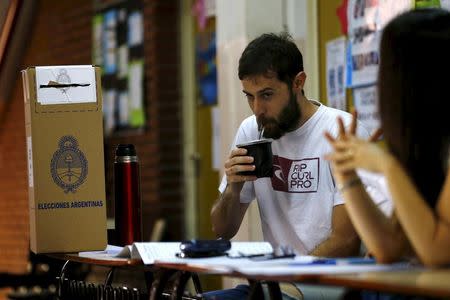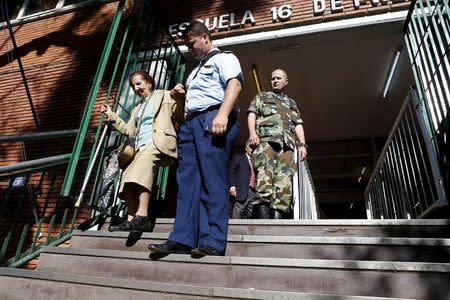Argentina's opposition takes on mighty Peronists in run-off vote
By Sarah Marsh and Hugh Bronstein BUENOS AIRES (Reuters) - Argentines voted in a run-off election on Sunday that hands the center-right opposition, led by Mauricio Macri, its best chance in more than a decade to wrest the presidency from the populist Peronists and set the economy on a more free-market course. In a sign of Argentines' weariness with a spluttering economy, rising crime and corruption, Macri went into the country's first ever second-round ballot with a comfortable lead in opinion polls over his ruling party rival Daniel Scioli. Outgoing President Cristina Fernandez, who was preceded in office by her late husband Nestor Kirchner, is as loved by the poor for her generous welfare programs as she is reviled by others for her confrontational style and the stifling controls she put on the economy. "We need a change," said Carlos Mombru, a 72-year-old retired engineer whose two sons left Argentina in search of better work opportunities during Fernandez's rule. "This country doesn't have an economic problem, it has a political problem," he said, referring to Argentina's rich hydrocarbon and metal resources, as well as its powerful grains industry. Barred from seeking a third straight term, Fernandez will leave office next month with Argentina deeply divided between those who back her protectionist policies and defense of worker rights and those who back the opposition's open-market policies. Scioli lost his front-runner status after the Oct. 25 first-round vote when Macri, the two-term mayor of Buenos Aires and scion of a wealthy family, unexpectedly came in right on his heels. But with one in 10 voters undecided, Scioli cannot be counted out. Whoever is sworn in on Dec. 10 will inherit a yawning fiscal deficit that Fernandez has financed by printing pesos, contributing to double-digit inflation. Foreign reserves are at a nine-year low and the county has been shut out of the global bond market due to a festering sovereign default. Macri wants to open Latin America's No. 3 economy to more investment by quickly lifting currency and trade controls, but will also have to put accounts in order after eight years of free-spending populism under Fernandez. "SAVAGE CAPITALISM" Scioli depicts his challenger as beholden to the wealthy and promises to defend Argentina from "savage capitalism". He acknowledges reforms are needed to lure investors but says monetary reforms should be slow to protect the poor. Macri accused Scioli of fear-mongering during the campaign, yet Scioli's message resonates with many voters. "He is a neo-liberal businessman with no real capacity to lead. We need change, but not the change Macri would bring," said 56-year-old Ana Machessi, expressing concern over the risk of a sharp devaluation under Macri. Counted among the world's richest countries a century ago, Argentina has stumbled from one economic crisis to another in past decades as leaders who stand firm on worker's rights over big business do battle with supporters of open markets in search of sustainable growth. Scarred by the most recent economic collapse in 2001 that tossed millions into poverty, many Argentines fear any dramatic shift in policy could make things worse. "Reading between the lines, it's clear Macri wants a drastic fiscal adjustment," said psychologist Cristina Castillo, who voted for Scioli. A new fiscal policy is exactly what investors want, along with the lifting of currency controls and a solution to a marathon legal battle with bondholders over unpaid debt stemming from Argentina's record default in 2002. The local Merval <.MERV> stock index has shot up 25 percent since Macri's muscular performance in the first round, as investors factored in the possibility he will win the run-off and dismantle a web of currency and trade controls. Fernandez, who often cites her late husband as her guiding light, appealed to voters to ensure that public funding of education, healthcare and programs for poor mothers remains. "When I leave, please God, I don't want to see ruined what it took us years to build!" she shouted to cheering and sobbing supporters at a recent rally. (Additional reporting by Miguel Lobianco and Jorge Otaola; Editing by Richard Lough and Stephen Powell)








